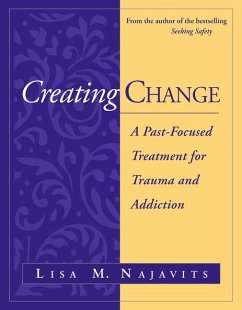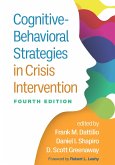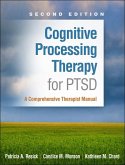Lisa M. Najavits (MA, U University of Massachusetts Medical School
Creating Change
A Past-Focused Treatment for Trauma and Addiction
Lisa M. Najavits (MA, U University of Massachusetts Medical School
Creating Change
A Past-Focused Treatment for Trauma and Addiction
- Broschiertes Buch
- Merkliste
- Auf die Merkliste
- Bewerten Bewerten
- Teilen
- Produkt teilen
- Produkterinnerung
- Produkterinnerung
This flexible, evidence-based manual offers counselors a compassionate approach to help people with trauma, addiction, or both explore their past.
Andere Kunden interessierten sich auch für
![Treating Traumatic Stress and Substance Misuse Treating Traumatic Stress and Substance Misuse]() Denise Hien (United States Rutgers Universityâ New Brunswick)Treating Traumatic Stress and Substance Misuse56,99 €
Denise Hien (United States Rutgers Universityâ New Brunswick)Treating Traumatic Stress and Substance Misuse56,99 €![Cognitive-Behavioral Strategies in Crisis Intervention Cognitive-Behavioral Strategies in Crisis Intervention]() Cognitive-Behavioral Strategies in Crisis Intervention77,99 €
Cognitive-Behavioral Strategies in Crisis Intervention77,99 €![Cognitive Processing Therapy for PTSD Cognitive Processing Therapy for PTSD]() Patricia A. Resick (United States Duke University Medical Center)Cognitive Processing Therapy for PTSD64,99 €
Patricia A. Resick (United States Duke University Medical Center)Cognitive Processing Therapy for PTSD64,99 €![Motivational Interviewing and CBT Motivational Interviewing and CBT]() Sylvie Naar (United States Florida State University)Motivational Interviewing and CBT47,99 €
Sylvie Naar (United States Florida State University)Motivational Interviewing and CBT47,99 €![Military Psychology Military Psychology]() Military Psychology84,99 €
Military Psychology84,99 €![Posttraumatic Play in Children Posttraumatic Play in Children]() Eliana Gil (VAPosttraumatic Play in Children43,99 €
Eliana Gil (VAPosttraumatic Play in Children43,99 €![Motivational Interviewing and CBT Motivational Interviewing and CBT]() Sylvie Naar (United States Florida State University)Motivational Interviewing and CBT49,99 €
Sylvie Naar (United States Florida State University)Motivational Interviewing and CBT49,99 €-
-
-
This flexible, evidence-based manual offers counselors a compassionate approach to help people with trauma, addiction, or both explore their past.
Hinweis: Dieser Artikel kann nur an eine deutsche Lieferadresse ausgeliefert werden.
Hinweis: Dieser Artikel kann nur an eine deutsche Lieferadresse ausgeliefert werden.
Produktdetails
- Produktdetails
- Verlag: Guilford Publications
- Seitenzahl: 377
- Erscheinungstermin: 27. Juni 2024
- Englisch
- Abmessung: 274mm x 215mm x 21mm
- Gewicht: 916g
- ISBN-13: 9781462554621
- ISBN-10: 1462554628
- Artikelnr.: 69841523
- Herstellerkennzeichnung
- Libri GmbH
- Europaallee 1
- 36244 Bad Hersfeld
- gpsr@libri.de
- Verlag: Guilford Publications
- Seitenzahl: 377
- Erscheinungstermin: 27. Juni 2024
- Englisch
- Abmessung: 274mm x 215mm x 21mm
- Gewicht: 916g
- ISBN-13: 9781462554621
- ISBN-10: 1462554628
- Artikelnr.: 69841523
- Herstellerkennzeichnung
- Libri GmbH
- Europaallee 1
- 36244 Bad Hersfeld
- gpsr@libri.de
Lisa M. Najavits, PhD, is Adjunct Professor at the University of Massachusetts Chan Medical School and Director of Treatment Innovations. She was on the faculty of Harvard Medical School (McLean Hospital) for 25 years and Boston University School of Medicine (Veterans Affairs Boston) for 12 years. Dr. Najavits specializes in the development of new counseling models for trauma and addiction, clinical trials research, and community-based care. She is author of over 200 publications, including the books Seeking Safety: A Treatment Manual for PTSD and Substance Abuse; Finding Your Best Self: Recovery from Addiction, Trauma, or Both; A Woman's Addiction Workbook; and Creating Change: A Past-Focused Treatment for Trauma and Addiction. She has served as president of the Society of Addiction Psychology of the American Psychological Association and has consulted widely on public health efforts in trauma and addiction, both nationally and internationally. She is a recipient of the Young Professional Award from the International Society for Traumatic Stress Studies, the Early Career Contribution Award from the Society for Psychotherapy Research, the Emerging Leadership Award from the Committee on Women in Psychology of the American Psychological Association, the Betty Ford Award from the Association for Multidisciplinary Education and Research in Substance Use and Addiction, and the Distinguished Alumna Award from Barnard College. Dr. Najavits is a licensed psychologist in Massachusetts and conducts a psychotherapy practice.
1. Overview of Creating Change
2. The Larger Context
3. How to Conduct Creating Change
4. The Counselor
Treatment Topics
- Introduction
- Create Change
- Trust versus Doubt
- Honor Your Survival
- Relationship Patterns
- Why Addiction?
- Respect Your Defenses
- Break the Silence
- Darkness and Light
- Emotions and Healing
- Tell Your Story
- Influences: Family, Community, Culture
- Knowing and Not Knowing
- Your Personal Truth
- What You Want People to Understand
- Listen to Your Body
- Memory
- Power Dynamics
- Deepen Your Story
- Growth
- Extra Topic: Understanding Trauma and Addiction
- Extra Topic: Recovery Strengths and Challenges
- Extra Topic: Your Relationships
Appendix A. Key Terms
Appendix B. Comparison of All Models Studied for PTSD/SUD
Appendix C. Comparison of Models by the Author
References
Index
2. The Larger Context
3. How to Conduct Creating Change
4. The Counselor
Treatment Topics
- Introduction
- Create Change
- Trust versus Doubt
- Honor Your Survival
- Relationship Patterns
- Why Addiction?
- Respect Your Defenses
- Break the Silence
- Darkness and Light
- Emotions and Healing
- Tell Your Story
- Influences: Family, Community, Culture
- Knowing and Not Knowing
- Your Personal Truth
- What You Want People to Understand
- Listen to Your Body
- Memory
- Power Dynamics
- Deepen Your Story
- Growth
- Extra Topic: Understanding Trauma and Addiction
- Extra Topic: Recovery Strengths and Challenges
- Extra Topic: Your Relationships
Appendix A. Key Terms
Appendix B. Comparison of All Models Studied for PTSD/SUD
Appendix C. Comparison of Models by the Author
References
Index
1. Overview of Creating Change
2. The Larger Context
3. How to Conduct Creating Change
4. The Counselor
Treatment Topics
- Introduction
- Create Change
- Trust versus Doubt
- Honor Your Survival
- Relationship Patterns
- Why Addiction?
- Respect Your Defenses
- Break the Silence
- Darkness and Light
- Emotions and Healing
- Tell Your Story
- Influences: Family, Community, Culture
- Knowing and Not Knowing
- Your Personal Truth
- What You Want People to Understand
- Listen to Your Body
- Memory
- Power Dynamics
- Deepen Your Story
- Growth
- Extra Topic: Understanding Trauma and Addiction
- Extra Topic: Recovery Strengths and Challenges
- Extra Topic: Your Relationships
Appendix A. Key Terms
Appendix B. Comparison of All Models Studied for PTSD/SUD
Appendix C. Comparison of Models by the Author
References
Index
2. The Larger Context
3. How to Conduct Creating Change
4. The Counselor
Treatment Topics
- Introduction
- Create Change
- Trust versus Doubt
- Honor Your Survival
- Relationship Patterns
- Why Addiction?
- Respect Your Defenses
- Break the Silence
- Darkness and Light
- Emotions and Healing
- Tell Your Story
- Influences: Family, Community, Culture
- Knowing and Not Knowing
- Your Personal Truth
- What You Want People to Understand
- Listen to Your Body
- Memory
- Power Dynamics
- Deepen Your Story
- Growth
- Extra Topic: Understanding Trauma and Addiction
- Extra Topic: Recovery Strengths and Challenges
- Extra Topic: Your Relationships
Appendix A. Key Terms
Appendix B. Comparison of All Models Studied for PTSD/SUD
Appendix C. Comparison of Models by the Author
References
Index








